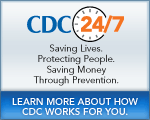HIV/AIDS and the Flu
Questions & Answers
HIV (human immunodeficiency virus) is the virus that causes AIDS (acquired immune deficiency syndrome). HIV kills or damages cells in the body’s immune system, gradually destroying the body’s ability to fight infection and certain cancers. CDC estimates that 1.1 million people are living with HIV/AIDS in the United States.
People with HIV/AIDS are considered at increased risk from serious influenza-related complications. Studies have shown an increased risk for heart- and lung-related hospitalizations in people infected with HIV during influenza season as opposed to other times of the year, and a higher risk of influenza-related death in HIV-infected people. Other studies have indicated that influenza symptoms might be prolonged and the risk of influenza-related complications is higher for certain HIV-infected people. Vaccination with a flu shot has been shown to produce an immune response against influenza viruses in certain people infected with HIV.
Because influenza can result in serious illness, HIV-infected persons are recommended for vaccination. To help you prepare for the flu this season, this fact sheet provides Questions & Answers to guide the administration of both flu shots and antiviral medications to people with HIV/AIDS.
Should people with HIV/AIDS receive the inactivated influenza vaccine?
People with HIV/AIDS are considered at increased risk from serious influenza-related complication and should receive inactivated influenza vaccine (the flu shot). Persons with advanced HIV disease may have a poor immune response to vaccination. Therefore, pre-exposure chemoprophylaxis (use of antiviral medications to prevent influenza) may be considered for these patients if they are likely to be exposed to people with influenza.
Are there people with HIV/AIDS who should NOT receive the inactivated influenza vaccine?
Contraindications to the use of inactivated influenza vaccine (the flu shot) in persons with HIV/AIDS are the same as those for persons without HIV/AIDS.
There are some people who should not get a flu vaccine without first consulting a physician. These include:
- People who have a severe allergy to chicken eggs.
- People who have had a severe reaction to an influenza vaccination.
- Children less than 6 months of age (influenza vaccine is not approved for this age group)
- People who have a moderate-to-severe illness with a fever (they should wait until they recover to get vaccinated.), and
- People with a history of Guillain-Barré Syndrome (a severe paralytic illness, also called GBS) that occurred after receiving influenza vaccine and who are not at risk for severe illness from influenza should generally not receive vaccine. Tell your doctor if you ever had Guillain-Barré syndrome. Your doctor will help you decide whether the vaccine is recommended for you.
Should people with HIV/AIDS receive the nasal-spray flu vaccine (Live Attenuated Influenza Vaccine [LAIV] (FluMist®))?
No. Persons with HIV/AIDS and persons with other medical conditions (such as asthma, diabetes, or heart disease) are not recommended to receive the LAIV (FluMist®). LAIV (FluMist®) contains a weakened form of the live influenza virus. LAIV (FluMist®) is approved for use only among healthy* people 2-49 years of age† who are not pregnant.
Should people with HIV/AIDS receive influenza antiviral medications for treatment of influenza?
It’s very important that antiviral drugs be used early to treat flu in people who are very sick with flu (for example people who are in the hospital) and people who are sick with flu and who have a greater chance of getting serious flu complications, such as people with HIV/AIDS.
Studies have shown that flu antiviral drugs work best for treatment if they are started within 2 days of getting sick. There may still be benefit in treating people with antiviral drugs even after two days have gone by, especially if the sick person has a greater chance of serious flu complications (See box) or if the person has certain symptoms (such as shortness of breath, chest pain/pressure, dizziness, or confusion) or is in the hospital because of the flu.
When should people with HIV/AIDS receive antiviral medications for chemoprophylaxis (prevention of influenza)?
People with HIV/AIDS should be prescribed antiviral medications to prevent infection with influenza when they cannot otherwise be protected during times when there is a high risk for exposure to influenza. Use should be in accordance with current recommendations from CDC or local public health authorities. Current CDC guidance on use of chemoprophylaxis should be consulted, and updated recommendations from CDC can be found on the Seasonal Influenza (Flu) and 2009 H1N1 Influenza web sites.
There are no published data on interactions between anti-influenza agents such as amantidine and rimantidine and drugs used in the management of HIV infected persons. Patients should be observed for adverse drug reactions to anti-influenza chemoprophylaxis agents, especially when neurologic conditions or renal insufficiency is present.
Should health care workers who have contact with HIV/AIDS patients be vaccinated?
Influenza vaccination is recommended for healthcare workers, including those who are involved in direct care of HIV-infected patients. More information about vaccination of health-care workers can be found in Prevention and Control of Influenza with Vaccines: Recommendations of the Advisory Committee on Immunization Practices (ACIP), 2010. Health-care workers who are healthy*, less than 50 years of age, and are not pregnant may receive the nasal-spray flu vaccine (LAIV/FluMist).
* "Healthy" indicates persons who do not have an underlying medical condition that predisposes them to influenza complications.
Contact Us:
- Centers for Disease Control and Prevention
1600 Clifton Rd
Atlanta, GA 30333 - 800-CDC-INFO
(800-232-4636)
TTY: (888) 232-6348 - Contact CDC-INFO



